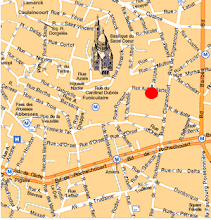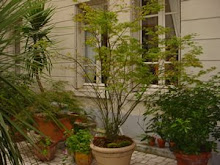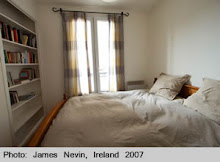 Women in a cotton field in the Kabodiyon district of Tajikistan, on a former collective farm. (Carolyn Drake for The New York Times )
Women in a cotton field in the Kabodiyon district of Tajikistan, on a former collective farm. (Carolyn Drake for The New York Times ) By David L. Stern
Wednesday, October 15, 2008
SHAARTUZ DISTRICT, Tajikistan: Farhod, a farmer in this dusty southwestern spit of land pushed up against the Afghan and Uzbek borders, said that he had committed a subversive and potentially punishable act this growing season. He planted watermelons in addition to the usual cotton.
Such is the precarious position of growers throughout this impoverished republic of seven million that Farhod refused to be photographed or to give his real name. He fears the authorities will destroy his crop, even though they had assured him that he could plant whatever he wanted this year.
"They press down on us from all sides," said Farhod, a father of eight, as he looked out on his neatly planted rows of millionaire, shakira and maistros watermelons. Cotton is king in Tajikistan, at least as far as the government is concerned. In fact, say agricultural experts, the regal metaphor is apt: the system is close to feudal.
Farmers are shackled to the land - "like slaves," one European official says - and forced to grow cotton through a complex system of debts and obligations.
The fact that cotton is often grown to the exclusion of other crops could have catastrophic implications this winter. After a dry summer, Tajikistan and possibly other Central Asian countries are facing severe food shortages, and international aid organizations are girding for a possible crisis.
Cotton is at the core of Tajikistan's economy and, reportedly, corruption. Companies associated with President Emomali Rahmon's inner circle monopolize the business, diplomats and industry experts say, paying taxes that account for 25 percent of the country's annual budget.
The cozy arrangement contributes to what the International Crisis Group, a private research organization, called in a 2005 report "political repression, economic stagnation, widespread poverty and environmental degradation."
Cotton growing, the group said, is "simple and exploitative."
For instance, Tajikistan's and Uzbekistan's governments have traditionally mobilized tens of thousands of university students and children as young as 10 to pick the harvest by hand, since many men from the work force emigrate to other countries for seasonal work.
For Farhod, as for other Tajik farmers, the problems began from his first days as an independent farmer three years ago, when the local collective farm, which dated from the Soviet era, was broken up. He was allotted, but does not own, 16 hectares, or 40 acres, of land and a $5,000 debt carried over automatically from the farm's arrears.
Each year most of his profits go to working off the debt, which was assumed by a cotton trading company. The company maintains a monopoly over all cotton trade in the Shaartuz region and sells Farhod his supplies on credit - at inflated prices, he said - and then buys his production at below-market prices.
Under this system the farmers are perpetually strapped, as they never see any cash. Farhod and others say that what little they earn goes for food and other essentials, but since they have no money in hand, they are forced to buy from the trading company at inflated prices.
"They pay us, but only 14 months later when they sell the cotton," Farhod said. "Each year the debts get bigger and bigger."
The government works in tandem with the trading companies, say Western experts, who spoke off the record because they need to work with Tajik officials. Until recently, officials enforced an unwritten law requiring farmers to devote 80 percent to 90 percent of their arable land to cotton production. When farmers have tried to grow something else, officials and the companies have claimed breach of contract and plowed the field under, farmers say.
Cotton's significance was underlined early this year when the International Monetary Fund revealed that the Tajik government had secretly diverted its hard currency reserves to use as collateral for $240 million in foreign loans for the cotton trading companies.
The scandal broke just as the country was paralyzed last winter by a heat and electricity crisis, which laid bare what many Western experts saw as the Tajik government's ineptitude and inadequacy.
Following a crippling civil war in the 1990s, international donors funneled hundreds of millions of dollars into the country, but now are beginning to question this policy.
Carlos Pinerua, an IMF official formerly responsible for Tajikistan, said in a telephone interview that the bar was set high for the Tajiks to regain the trust of the international multilaterals, which are multinational organizations that finance development.
Noting that the Tajiks had lied to the IMF over a 10-year period, he said, "We will have to look at how to help the country - they are an IMF member - but financing will be very hard."
With Tajikistan's currency reserves now close to zero, the country is highly vulnerable to economic shocks, like the current credit crisis, Western diplomats say. Also complicating the picture is Tajikistan's endemic governmental dysfunction and corruption.
A case in point is the fate of one of the government officials at the heart of the loan scandal, the governor of the central bank, Murodali Alimardon. Far from being fired, Alimardon was promoted to deputy prime minister, and put in charge of agricultural reforms.
This year the Tajik government issued a decree guaranteeing farmers the right to cultivate their land as they see best. Farhod says that he has been planting about 12 hectares of the 16 hectares in cotton and the rest in other crops.
Other farmers say that the cotton quota remains in effect, though slightly lower at 70 percent.
But few here place much trust in a decree. "So far, they're not against the melons, but we'll see," Farhod said.

A Place in the Auvergne
A Place in My Country
Ian Walthew
Farm Blogs
Ranch Blogs
Rural Blogs
Countryside Blogs
Smallholding Blogs
Urban Homesteading Blogs
Homesteading Blogs
Homestead Blogs
Allotment Blogs
Apiculture Blogs
Bee-keeping Blogs
Auvergne
Auvergnate
Auvergnat
Auvergnats
France
Rural France
Blogs about France
Paris / Montmartre/ Abbesses holiday / vacation furnished apartment rental





















No comments:
Post a Comment